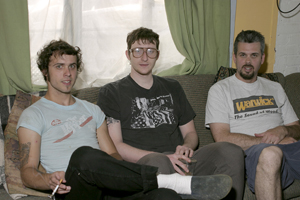Ahleuchatistas are an American instrumental math rock group that mix influences of jazz, progressive rock, avant-garde, and experimental to create a unique sound. The band was formed in Asheville, North Carolina in November 2002.
Ahleuchatistas


Ahleuchatistas are an American instrumental math rock group that mix influences of jazz, progressive rock, avant-garde, and experimental to create a unique sound. The band was formed in Asheville, North Carolina in November 2002.